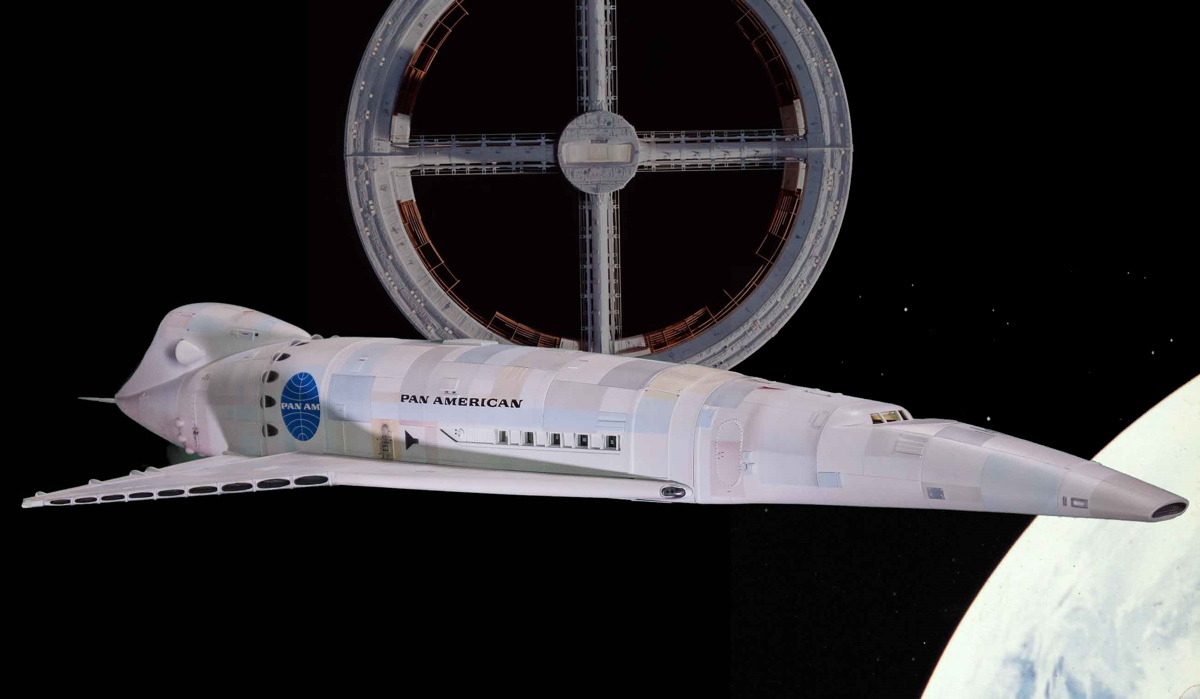Maybe this was mentioned upthread but I missed it: The Concorde flew at around 60,000 feet (not sure why.) Will the Boom Overture do so the same?
I didn’t overlook it, but I’m not sure what the relevance of it is, except to prove the technical correctness of your assertion that the majority of people, on a worldwide basis, have probably never been on a plane. The thing is that the majority of people, on a worldwide basis, have probably never done any long-distance travel, which can be regarded as a luxury available only to a privileged minority. The point is, however, that virtually all such travel today is by air. Even the poorest countries have their own airlines.
Your question was, “By your argument, should we allow air traffic at all?”. And the answer is clearly that of course we should, because it’s a critical part of our global transportation infrastructure for passengers and cargo. I don’t see that to be in any way analogous to supersonic flight. On the contrary, I see supersonic passenger service to be a closer analogy to that other sci-fi pipe dream, rapid transportation between distant cities using rockets on suborbital trajectories. If you can justify the former, why not the latter? At what point are you dealing with outrageous and unjustifiable environmental costs for very little marginal gain?
Air travel as a whole is largely a convenience and luxury for the rich. As far as I can tell that’s your argument against supersonic flight: “The one and only benefit it will offer is to allow a privileged few to cut a few hours off their travel time”
The fact that the majority of humanity never travels by air at all isn’t a triviality; it’s central to my point.
It’s very easy to decry the excesses of the wealthy as long as you define the wealthy as “people richer than me, personally”. Much harder when you have to reckon with the fact that you are among the wealthy few and limits to such luxuries might actually require you to give something up that you enjoy.
We’re either talking past each other or will just have to agree to disagree. The above statement is irrelevant for the following reasons that I already stated:
-
While the majority of humanity may not travel by air, virtually all of those who travel at all (over any significant distance) now travel by air. For that reason …
-
Air travel is now an essential part of our global transportation infrastructure. If you include air cargo (as I think one should) then one can easily make the case that the majority of at least the first-world population benefits directly and indirectly from air transport, even if they personally have never been on a plane.
I’m repeating myself here but perhaps I didn’t make those points clear enough. And I just can’t see supersonic travel ever being anything other than an exotic perk for a few elite, at a potentially huge environmental cost. Sure, in the very early days of aviation, some may have made the same kinds of statements about any kind of air travel, but air transport inevitably became the virtually universal global transportation system for everything except heavy bulk cargo. Do you seriously imagine supersonic transport similarly becoming ubiquitous around the world? Maybe you do, but I certainly don’t, because I’m acutely aware of its drawbacks and extremely skeptical that any technology will ever resolve them.
Quick long-distance travel for business or pleasure (as opposed to, say, long-term migration) is an exotic perk for a few elite, at potentially huge environmental cost.
“Except heavy bulk cargo” is carrying a lot of water here; air cargo is an incredibly small fraction of global transportation. Almost all goods qualify as heavy bulk cargo.
Air travel by people is, as I’ve pointed out, a luxury good. It’s used almost entirely by the wealthy. Yes, air travel does in fact make up almost all global travel, but almost all global travel is a luxury good used by the global elite.
And how about air cargo. I did a quick search for what sorts of goods are transported by air, and I found “pharmaceuticals, electronics, and perishable agricultural products”. Seems about right. Something’s got to be either quite valuable or require quick delivery to be worth flying somewhere. I would estimate that those goods are also almost entirely consumed by the globally wealthiest top few percent as well.
Air travel is ubiquitous in the sense that there is a lot of it, but mostly because it is used very heavily by the rich, and very little by everyone else.
I imagine that humanity as a whole is going to continue getting wealthier, and it’s at least somewhat plausible that that increased wealth will be used for more luxurious or quicker travel.
I think we’ve both made our case fairly clearly. I’ll let you have the last word unless you want to keep going.
I guess the point is that supersonic air travel is a luxury even by the standards of wealthy countries, so while a large portion of wealthy country’s citizens benefit from air travel in general, very few will benefit from supersonic travel. In other words the market is very small. Whether it is too small or not, I guess we will find out in time.
Something against the modern supersonic market is that, unlike in Concord’s time, a business traveller on a normal subsonic airliner will generally have access to the internet and can remain productive in a way they couldn’t in the past. This means that although they won’t have as much face to face time at their destination, they can still remain connected to their business while in the air. It’s not just dead time.
Only the very rich have personal jets, but there’s a market for them. Same with large yachts. I don’t see why we can’t have expensive products that only the very rich can afford. It’s not like the rest of us will benefit if the rich don’t have supersonic jets to fly around in. And who knows, the development process might invent some advancements that do benefit the rest of us in some other way.
This is the precise point that I’m making. We in wealthy countries tend to consider ourselves not-wealthy, and tend to think that only the luxuries of those even more wealthy than we are wasteful extravagances. But in fact almost all air travel should be considered a wasteful extravagance for the wealthy, it’s just that we’re used to it and don’t consider ourselves wealthy.
I don’t know if that’s been proven; the main impediment to using the Concorde on shorter flights was because the sonic booms were considered to be obnoxious, so they were restricted to flying supersonic over water. So there was a definite non-economic reason they weren’t used on shorter flights.
That said, there’s probably a minimum distance that would make it worth the trouble of taking off, getting up to speed and altitude, and then descending/slowing down and landing versus doing the same in a 737. My guess is that it’s probably somewhere in the ballpark of a flight between say… Dallas and NYC, as under that and the amount of time spent ascending/descending will be too significant for supersonic travel to show much in the way of time reduction on the flight.
Is there any market for dirt-poor refugee/ undocumented steerage class ocean travel any more? Or does anyone still make the Hajj at least as far as Jeddah by sea?
Maybe not ocean travel but a lot of the refugees making their way to Europe are doing so via rickety boats and ships. And people were doing the same thing to get from Cuba to Miami, although I don’t know if that’s still a thing.
The development of supersonic airliners depends on the assumption that there will be enough demand to make it viable.
There is no doubt that there are quite a lot of people for whom the cost of a ticket is far less than the cost of the time ‘wasted’ by flying long distances at subsonic speeds. The question is; are there enough of them and will they want to travel often enough to make a scheduled service viable.
Sure there’s a market there, but it is not currently an airline market, it is a business jet market. The question is whether there is an airline market for supersonic airliners. United obviously think there is, or at least there is the potential and they want to keep their finger in that pie in the meantime. It is also quite possible that an airline like United will be keen to have something like the Boom because of the associated status of being able to say they offer supersonic flights. A bit like how they show you pictures of first class seats but mostly sell cattle class, or how a company like Red Bull is prepared to sink millions of dollars into a Formula One racing team so they can sell lots of $1 cans of drink.
Red bull costs like $2/can. That’s how come they can afford two formula 1 teams (Toro rosso/alpha tauri)
If they sold them for $3 they could afford three teams.
The maths checks out.
Continuing the hijack. I assume that having an F1 team means that someone high in the organisation is a big F1 fan and that marketing/advertising justifications are just something they come up with to convince the rest of the decision makers to go along with it. Fortunately for Red Bull, they have two very good teams (given that Torro Rosso is a driver development team.)
Or at least, the status of being able to say they have purchase options on them. Which is not a reliable predictor of anything. In the 60s Pan Am believed they would be flying two different supersonic airliners. The film 2001: A Space Odyssey speculated that Pan Am would have flights to the moon. Pan Am felt that, in their world at least, which consisted of long-distance international travel, supersonic was the future of aviation. In the end, they decided the Concorde was completely impractical and canceled their order for 10, the American SST was never developed, scheduled passenger flights to the moon never materialized, and Pan Am itself soon ceased to exist. The images below stand as a rather sad reminder of the unrealistic optimism of the 60s.
I actually had Pan Am in mind when I wrote that.
Edit: Air New Zealand, my old employer, had operated Auckland, LA, London flights for a long time before finally deciding that the poor economics outweighed the status of operating the service and canned the whole thing shortly before COVID. Their focus had turned towards the much more lucrative direct NZ - USA market,
Even the 747 has pretty much bit the dust, too.

